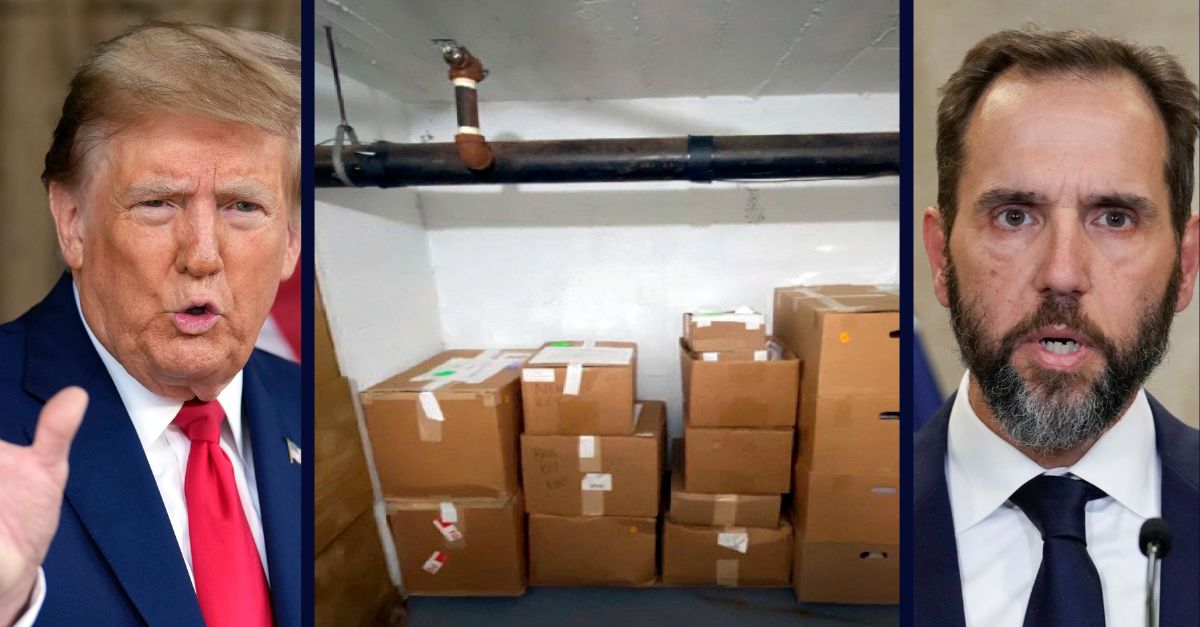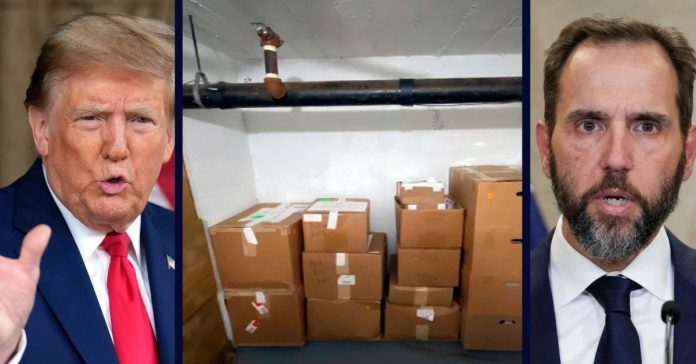
Republican presidential candidate former President Donald Trump speaks at his Mar-a-Lago estate Thursday, Feb. 8, 2024, in Palm Beach, Fla. (AP Photo/Rebecca Blackwell)/Center: This image, contained in the indictment against former President Donald Trump, shows boxes of records that had been stored in the Lake Room at Trump’s Mar-a-Lago estate in Palm Beach, Fla., after they were moved to a storage room on June 24, 2021. (Justice Department via AP)/Right: Special counsel Jack Smith, (AP Photo/J. Scott Applewhite, File).
Donald Trump‘s most recent attempt to introduce an entirely new defense theory in his classified documents case by “smuggling” in claims of vindictive prosecution by comparing himself to Joe Biden, Hillary and Bill Clinton and others, should be flatly rejected, special counsel Jack Smith urged the judge overseeing the case against the former president in Florida.
As Law&Crime previously reported, Trump argued in a Friday reply in support of his motion to compel discovery — opposed by Smith — that he was “entitled to discovery and a hearing concerning selective and vindictive prosecution” to defend himself and, ultimately, dismiss the charges against him. As proof of his claim, the filing cited special counsel Robert Hur’s decision not to charge Biden for his retention of documents from his time as Barack Obama’s vice president. That decision came down to a number of factors, but chief among them was a publicly controversial claim in the 388-page report that said Biden’s “poor memory” precluded him from breaking retention laws. Notably, Hur also underlined that Trump’s alleged offenses were far more serious.
Meanwhile, Trump and co-defendants Waltine Nauta and Carlos De Oliveira claim the decision not to charge Biden over his unlawful retention of classified documents supports their theory and warrants the new hearing.
But Trump’s attempt on Feb. 9 to compel discovery materials by shifting the basis of his defense theory to new allegations involving “selective and vindictive prosecution” was “procedurally improper,” federal prosecutors wrote in a “conditional motion” for permission from U.S. District Judge Aileen Cannon to file a separate reply to the new allegations raised in Trump’s Friday filing.
“The defendants are, of course, entitled to attempt to satisfy the relevant standards. But they must do so in a procedurally appropriate manner — by raising their arguments and evidence in a motion to which the Government is entitled to respond, and where the defendants have a right of reply. They may not do so by smuggling this issue into a reply brief. The requirement that they follow appropriate procedures is particularly apt here, since their deadline to file Rule 12 motions is less than two weeks away, and they have already stated that they intend to file a motion to dismiss for selective prosecution,” prosecutors wrote on Sunday. “Declining to consider the arguments and evidence raised for the first time in the reply brief would therefore not prejudice the defendants in any way; it would simply assure that the arguments and evidence are raised in a procedurally appropriate manner.”
“Sound judicial administration counsels the court to disregard the new factual allegations and legal arguments raised for the first time in the defendant’s reply brief, and direct the defendants to raise their arguments in the motion they have signaled by February 22,” Smith continued.
When positing their defense theories in their motion last week, Trump’s lawyers also zeroed in on Hillary Clinton, arguing that “the efforts by President Biden and the Special Counsel’s Office violate [the] Justice Manual … and established norms prohibiting election interference by prosecutors, which, ironically, DOJ relied on to prosecute Hillary Clinton in connection with the deletion of 31,380 emails that included classified information and were stored at Clinton’s home.”
But back in mid-January, Trump’s motion to compel discovery at no point suggested their primary defense theory would be one of vindictive prosecution, the special counsel argued to Cannon, a Trump appointee.
Instead, Smith said Trump’s lawyers made a narrower argument of “improper coordination between prosecutors and the National Archives and Records Administration” while citing what Trump has historically argued was “evidence of bias and investigative misconduct.”
“The defendants advanced none of these legal or factual claims in their motion to compel, despite the fact that all but one of them were known to them before they filed their motion,” the nine-page reply brief states.
The bar to meet a selective prosecution claim is high.
Federal prosecutors reminded the court they have expressed this notion repeatedly to Trump’s lawyers in previous hearings and despite this, they say, Trumps’ defense “has not cited, addressed or attempted to satisfy the relevant standard for such unique relief” despite somehow, for weeks, appearing ready to press that argument anyway.
Yet now in this latest motion and “for the first time” — and over a dozen pages — Trump’s lawyers suddenly introduce “new legal and factual claims”— all of which were “incomplete and misleading,” the brief says.
Underlining their aim, prosecutors noted Cannon’s own decisions on the “importance of raising legal issues in a procedurally appropriate manner” for hearings involving Trump’s co-defendants in Florida:
“As this Court has observed in a similar context, no authority supports the proposition that a defendant who fails to raise an argument in an opening motion ‘nevertheless can insist on Court review of arguments not raised in the Motion simply because the opposing party chooses to raise new issues in opposing the motion,’” the filing says.
Smith notes that his team has conferred with defense lawyers, who indicated that they will file an opposition to Smith’s filing.
Meanwhile in Florida on Monday, Trump appeared in person for a closed hearing regarding the handling of classified evidence for trial, according to The Associated Press.
The Florida trial is currently set to get underway May 20.
Colin Kalmbacher contributed to this report.
Have a tip we should know? [email protected]

